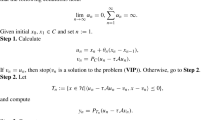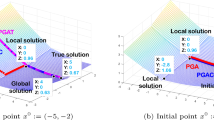Abstract
A large number of free boundary problems can be formulated as linear-complementarity problems. In this paper, we propose an inexact alternating direction method of multipliers for solving linear complementarity problem arising from free boundary problems by using the special structure of these problems. The convergence of our proposed method is proved. Numerical results show that the proposed method is feasible and effective, and it is significantly faster than modified alternating direction implicit algorithm and many other methods, especially when dimension of the problem being solved is large.
Similar content being viewed by others
References
Ahn, B.H.: Solutions of nonsymmetric linear complementarity problems by iterative methods. J. Optim. Theory Appl. 33, 175–185 (1981)
Bai, Z.-Z.: On the monotone convergence of the projected iteration methods for linear complementarity problem. Numer. Math. - A Journal of Chinese Universities (English Series) 5, 228–233 (1996)
Bai, Z.-Z.: The convergence of parallel iteration algorithms for linear complementarity problems. Comput. Math. Appl. 32, 1–17 (1996)
Bai, Z.-Z.: On the convergence of the multisplitting methods for the linear complementarity problem. SIAM J. Matrix Anal. Appl. 21, 67–78 (1999)
Bai, Z.-Z.: Experimental study of the asynchronous multisplitting relaxation methods for linear complementarity problems. J. Comput. Math. 20, 561–574 (2002)
Bai, Z.-Z.: Modulus-based matrix splitting iteration methods for linear complementarity problems. Numer. Linear Algebra Appl. 6, 917–933 (2010)
Bai, Z.-Z., Evans, D.J.: Matrix multisplitting relaxation methods for linear complementarity problems. Int. J. Comput. Math. 63, 309–326 (1997)
Bai, Z.-Z., Evans, D.J.: Asynchronous multisplitting relaxation methods for linear complementarity problems. Int. J. Comput. Math. 70, 519–538 (1999)
Bai, Z.-Z., Evans, D.J.: Matrix multisplitting methods with applications to linear complementarity problems: parallel synchronous and chaotic methods. Ré,seaux et Systémes Répartis: Calculateurs Parallelés 13, 125–154 (2001)
Bai, Z.-Z., Evans, D.J.: Parallel chaotic multisplitting iterative methods for the large sparse linear complementarity problem. J. Comput. Math. 19, 281–292 (2001)
Bai, Z.-Z., Evans, D.J.: Matrix multisplitting methods with applications to linear complementarity problems: parallel asynchronous methods. Int. J. Comput. Math. 79, 205–232 (2002)
Bai, Z.-Z., Huang, Y. -G.: Relaxed asynchronous iterations for the linear complementarity problem. J. Comput. Math. 20, 97–112 (2002)
Bai, Z.-Z., Huang, Y.-G.: A class of asynchronous parallel multisplitting relaxation methods for large sparse linear complementarity problem. J. Comput. Math. 21, 773–790 (2003)
Bai, Z., Zhang, L.-L.: Modulus-based synchronous multisplitting iteration methods for linear complementarity problems. Numer. Linear Algebra Appl. 20, 425–439 (2013)
Baiocci, C.: Sur un probleme a frontiere libre traduisant le filtrage de liquides a travers des milieux proeux. Comptes Rendus Acad. Sci. Paris A273, 1215–1217 (1971)
Bear, J.: Dynamics of Fluids in Porous Media. Elsevier, New York (1972)
Bertsekas, D.: Nonlinear Programming, Mass. 2nd edn. Athena Scientific, Belmont (1999)
Berman, A., Plemmons, R.J.: Nonnegative Matrices in the Mathematical Sciences. Academic, New York (1979)
Chan, R.H., Tao, M., Yuan, X.-M.: Linearized alternating direction method for constrained linear least-squares problem. East Asian J. Appl. Math. 2, 326–341 (2012)
Cimmati, G.: On a problem of the theory of lubrication governed by a variational inequality. Appl. Math. Optim. 3, 227–243 (1977)
Cottle, R.W., Golub, G.H., Sacher, R.S.: On the solution of large, structured linear complementarity problems: the block partitioned case. Appl. Math. Optim. 4, 347–363 (1978)
Cottle, R.W., Pang, J.-S., Stone, R.E.: The Linear Complementarity Problem. Academic, San Diego (1992)
Cottle, R.W., Sacher, R.S.: On the solution of large, structured linear complementarity problems: the tridiagonal case. Appl. Math. Optim. 3, 321–340 (1977)
Cryer, C.W.: The efficient solution of linear complementarity problems for tridiagonal Minkowski matrices. ACM Trans. Math. Soft. 9, 199–214 (1983)
Cryer, C.W.: The solution of a quadratic programming using systematic overrelaxation. SIAM J. Control 9, 385–392 (1971)
Dong, J.-L., Jiang, M.-Q.: A modified modulus method for symmetric positive-definite linear complementarity problems. Numer. Linear Algebra Appl. 16, 129–143 (2009)
Duvaut, G., Lion, J.L.: Inequalities in Mechanics and Physics. Dunod, Paris (1976)
Gabay, D., Mercier, B.: A dual algorithm for the solution of nonlinear variational problems via finiteelement approximations. Comput. Math. Appl. 2, 17–40 (1976)
Glowinski, R., Lions, J.L., Tremolieres, R.: Numerical Analysis of Variational Inequalities. North-Holland, Amsterdam (1981)
Hadjidimos, A., Lapidakis, M., Tzoumas, M.: On iterative solution for linear complementarity problem with an H+-matrix. SIAM J. Matrix Anal. Appl. 33, 97–110 (2011)
Hadjidimos, A., Tzoumas, M.: Nonstationary extrapolated modulus algorithms for the solution of the linear complementarity problem. Linear Algebra Appl. 431, 197–210 (2009)
Harker, P.T., Xiao, B.: Newton’s method for the nonlinear complementarity problem. Math. Program. Series B 48, 339–357 (1990)
Kindedehrer, G., Stampacchia, G.: An Introduction to Variational Inequalities and Their Applications. Academic Press, New York (1983)
Lin, Y., Cryer, C.W.: An alternating direction implicit algorithm for the solution of linear complementarity problems arising from free boundary rroblems. Appl. Math. Optim. 13, 1–17 (1985)
Mangasarian, O.L.: Solutions of symmetric linear complementarity problems by iterative methods. J. Optim. Theory Appl. 22, 465–485 (1977)
Murty, K.G.: Linear complementarity, linear and nonlinear programming internet edition (1997)
Pang, J.-S.: On the convergence of a basic iterative method for the implicit complementarity problem. J. Optim. Theory Appl. 37, 149–162 (1982)
Pang, J.-S.: Necessary and sufficient conditions for the convergence of iterativemethods for the linear complementarity problem. J. Optim. Theory Appl. 42, 1–17 (1984)
Tseng, P.: On linear convergence of iterative methods for the variational inequality problem. J. Comput. Appl. Math. 60, 237–252 (1995)
Van Bokhoven, W.M.G.: A Class of Linear Complementarity Problems is Solvable in Polynomial Time. Unpublished Paper, Department of Electrical Engineering, University of Technology, The Netherlands (1980)
Wu, C.-L., Tai, X.-C.: Augmented Lagrangian method, dual methods, and split Bregman iteration for ROF, vectorial TV, and high order models. SIAM J. Imaging Sci. 3, 300–339 (2010)
Zhang, J.-J.: MSSOR-Based alternating direction method for symmetric positive-definite linear complementarity problems. Numer. Algor. 68, 631–644 (2015)
Zhang, L.-L.: Two-step modulus based matrix splitting iteration for linear complementarity problems. Numer. Algor. 57, 83–99 (2011)
Zheng, N., Yin, J.-F.: Accelerated modulus-based matrix splitting iteration methods for linear complementarity problem. Numer. Algor. 57, 83–99 (2011)
Author information
Authors and Affiliations
Corresponding author
Rights and permissions
About this article
Cite this article
Zhang, JJ., Zhang, JL. & Ye, WZ. An inexact alternating direction method of multipliers for the solution of linear complementarity problems arising from free boundary problems. Numer Algor 78, 895–910 (2018). https://doi.org/10.1007/s11075-017-0405-y
Received:
Accepted:
Published:
Issue Date:
DOI: https://doi.org/10.1007/s11075-017-0405-y
Keywords
- Alternating direction method
- Alternating direction implicit
- Augmented Lagrangian
- Linear complementarity problems
- Iterative methods
- Symmetric positive definite




